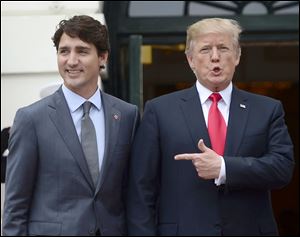
EDITORIAL
What next on NAFTA?
10/15/2017A major part of Donald Trump’s campaign for the presidency was better trade deals. He made a direct and passionate appeal to blue-collar, middle class people in Michigan, in western Pennsylvania, and here in Toledo and northwestern Ohio.
We will make American cars American, again, the President said.
We will “bring back steel,” he told people in Pittsburgh and Youngstown.

President Trump met with Canadian Prime Minister Justin Trudeau in Washington last Wednesday. NAFTA was on their agenda.
Click here to view more Blade editorials
We will renegotiate the North American Free Trade Agreement, he said.
For Toledo, for Detroit, for Pittsburgh, for Youngstown, for Buffalo, for Cleveland, and Gary, Ind., NAFTA was a bad deal. It devastated these cities, some of which have still not recovered. Moreover, and a largely untold story, NAFTA decimated many Ohio and Indiana and Michigan small and mid-size towns that depended on one, or two, or three local factories. That is why the President did so well electorally in those parts of America. No one had spoken to these issues since Ross Perot. (The President was also on the right side, at least rhetorically, of the culture wars.)
Many, many people, especially on Wall Street took Mr. Trump’s NAFTA promise with a shaker of salt. They said there might be some tweaking, but NAFTA would emerge essentially in tact. NAFTA is technically out of date in many ways. It was written before the days of Internet commerce, for example.
That prediction was wrong and based on a misreading of Mr. Trump. This President is serious about his promises.
So, the President, through his staff and his trade representative and his commerce secretary, has been engaged in an attempted renegotiation of NAFTA. And now we are nearing decision time, and no one really knows where we are.
The President often throws his core constituency rhetorical red meat. But what people in all of these damaged cities and towns really want, need and expect from him are new manufacturing jobs. To get that, they need a healthy economy, which we have; the availability of capital, which tax reform might create; and better trade structures and deals.
Are we going to get better trade deals?
NAFTA is like the Iranian no nukes agreement or Obamacare — people want to know what the better deal is. What will replace it?
Unfortunately, the President, while he sticks to his promises and agenda, has not been able to make many deals so far.
Last week, meeting with Prime Minister Justin Trudeau, the President raised the possibility of scrapping NAFTA entirely and pursuing a bilateral trade agreement between Canada and the United States.
“It’s possible we won’t be able to reach a deal with one or the other,” meaning Mexico, he said. “But in the meantime, we’ll be able to make a deal with one. But I think we have a chance to do something very creative that’s good for Canada, Mexico, and the United States.”
OK, that might work. The NAFTA negotiations are not going swimmingly with Mexico. And Mr. Trump also told Forbes magazine that he likes “bilateral deals.” But someone has to flesh these out. What would these new, bilateral deals look like exactly?
The Americans depending on the President have to know that scrapping NAFTA without something to replace it will not make their lives worse.
According to the Atlantic Council, Canada and Mexico are the first and third export markets for U.S. agricultural products. North Dakota and Montana send more than 70 percent of their exports to Canada. Michigan, Arizona, and Texas all send more than 30 percent of their exports to Mexico.
It is still early in the Trump Administration, but at some point there has to be a positive result for middle America. He’s right about what NAFTA did to us. But what is Plan B?
If America is going to start “winning” in trade and manufacturing again, the President needs to start putting points up on fair trade.